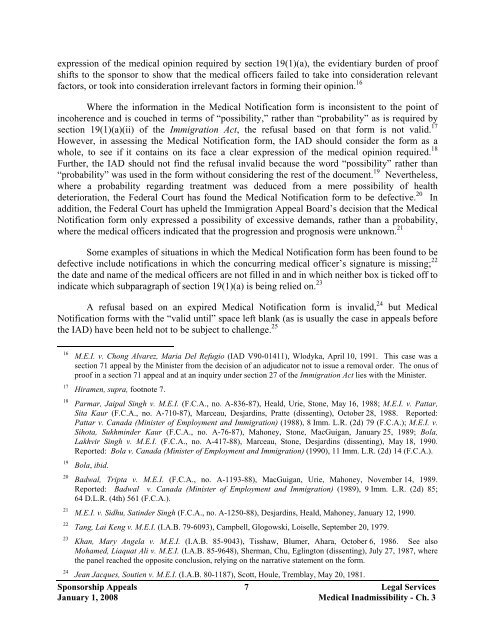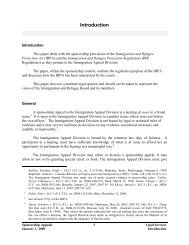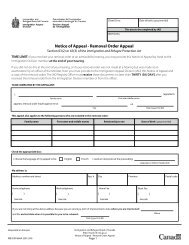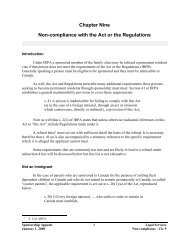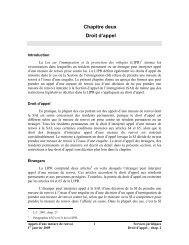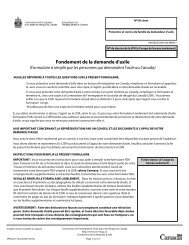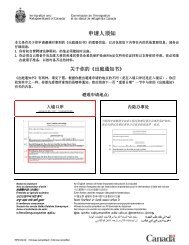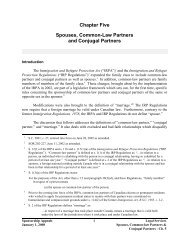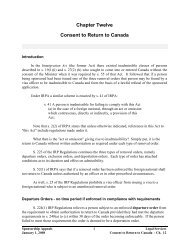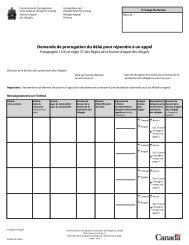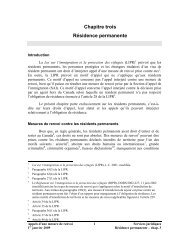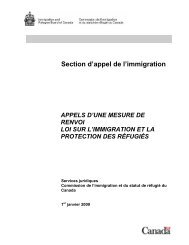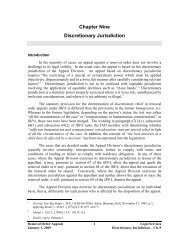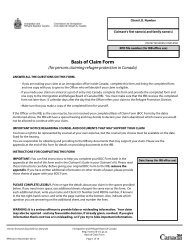Sponsorship Appeals - Immigration and Refugee Board of Canada
Sponsorship Appeals - Immigration and Refugee Board of Canada
Sponsorship Appeals - Immigration and Refugee Board of Canada
You also want an ePaper? Increase the reach of your titles
YUMPU automatically turns print PDFs into web optimized ePapers that Google loves.
expression <strong>of</strong> the medical opinion required by section 19(1)(a), the evidentiary burden <strong>of</strong> pro<strong>of</strong><br />
shifts to the sponsor to show that the medical <strong>of</strong>ficers failed to take into consideration relevant<br />
factors, or took into consideration irrelevant factors in forming their opinion. 16<br />
Where the information in the Medical Notification form is inconsistent to the point <strong>of</strong><br />
incoherence <strong>and</strong> is couched in terms <strong>of</strong> “possibility,” rather than “probability” as is required by<br />
section 19(1)(a)(ii) <strong>of</strong> the <strong>Immigration</strong> Act, the refusal based on that form is not valid. 17<br />
However, in assessing the Medical Notification form, the IAD should consider the form as a<br />
whole, to see if it contains on its face a clear expression <strong>of</strong> the medical opinion required. 18<br />
Further, the IAD should not find the refusal invalid because the word “possibility” rather than<br />
“probability” was used in the form without considering the rest <strong>of</strong> the document. 19 Nevertheless,<br />
where a probability regarding treatment was deduced from a mere possibility <strong>of</strong> health<br />
deterioration, the Federal Court has found the Medical Notification form to be defective. 20 In<br />
addition, the Federal Court has upheld the <strong>Immigration</strong> Appeal <strong>Board</strong>’s decision that the Medical<br />
Notification form only expressed a possibility <strong>of</strong> excessive dem<strong>and</strong>s, rather than a probability,<br />
where the medical <strong>of</strong>ficers indicated that the progression <strong>and</strong> prognosis were unknown. 21<br />
Some examples <strong>of</strong> situations in which the Medical Notification form has been found to be<br />
defective include notifications in which the concurring medical <strong>of</strong>ficer’s signature is missing; 22<br />
the date <strong>and</strong> name <strong>of</strong> the medical <strong>of</strong>ficers are not filled in <strong>and</strong> in which neither box is ticked <strong>of</strong>f to<br />
indicate which subparagraph <strong>of</strong> section 19(1)(a) is being relied on. 23<br />
A refusal based on an expired Medical Notification form is invalid, 24 but Medical<br />
Notification forms with the “valid until” space left blank (as is usually the case in appeals before<br />
the IAD) have been held not to be subject to challenge. 25<br />
16<br />
17<br />
18<br />
19<br />
20<br />
21<br />
22<br />
23<br />
24<br />
M.E.I. v. Chong Alvarez, Maria Del Refugio (IAD V90-01411), Wlodyka, April 10, 1991. This case was a<br />
section 71 appeal by the Minister from the decision <strong>of</strong> an adjudicator not to issue a removal order. The onus <strong>of</strong><br />
pro<strong>of</strong> in a section 71 appeal <strong>and</strong> at an inquiry under section 27 <strong>of</strong> the <strong>Immigration</strong> Act lies with the Minister.<br />
Hiramen, supra, footnote 7.<br />
Parmar, Jaipal Singh v. M.E.I. (F.C.A., no. A-836-87), Heald, Urie, Stone, May 16, 1988; M.E.I. v. Pattar,<br />
Sita Kaur (F.C.A., no. A-710-87), Marceau, Desjardins, Pratte (dissenting), October 28, 1988. Reported:<br />
Pattar v. <strong>Canada</strong> (Minister <strong>of</strong> Employment <strong>and</strong> <strong>Immigration</strong>) (1988), 8 Imm. L.R. (2d) 79 (F.C.A.); M.E.I. v.<br />
Sihota, Sukhminder Kaur (F.C.A., no. A-76-87), Mahoney, Stone, MacGuigan, January 25, 1989; Bola,<br />
Lakhvir Singh v. M.E.I. (F.C.A., no. A-417-88), Marceau, Stone, Desjardins (dissenting), May 18, 1990.<br />
Reported: Bola v. <strong>Canada</strong> (Minister <strong>of</strong> Employment <strong>and</strong> <strong>Immigration</strong>) (1990), 11 Imm. L.R. (2d) 14 (F.C.A.).<br />
Bola, ibid.<br />
Badwal, Tripta v. M.E.I. (F.C.A., no. A-1193-88), MacGuigan, Urie, Mahoney, November 14, 1989.<br />
Reported: Badwal v. <strong>Canada</strong> (Minister <strong>of</strong> Employment <strong>and</strong> <strong>Immigration</strong>) (1989), 9 Imm. L.R. (2d) 85;<br />
64 D.L.R. (4th) 561 (F.C.A.).<br />
M.E.I. v. Sidhu, Satinder Singh (F.C.A., no. A-1250-88), Desjardins, Heald, Mahoney, January 12, 1990.<br />
Tang, Lai Keng v. M.E.I. (I.A.B. 79-6093), Campbell, Glogowski, Loiselle, September 20, 1979.<br />
Khan, Mary Angela v. M.E.I. (I.A.B. 85-9043), Tisshaw, Blumer, Ahara, October 6, 1986. See also<br />
Mohamed, Liaquat Ali v. M.E.I. (I.A.B. 85-9648), Sherman, Chu, Eglington (dissenting), July 27, 1987, where<br />
the panel reached the opposite conclusion, relying on the narrative statement on the form.<br />
Jean Jacques, Soutien v. M.E.I. (I.A.B. 80-1187), Scott, Houle, Tremblay, May 20, 1981.<br />
<strong>Sponsorship</strong> <strong>Appeals</strong> 7 Legal Services<br />
January 1, 2008 Medical Inadmissibility - Ch. 3


